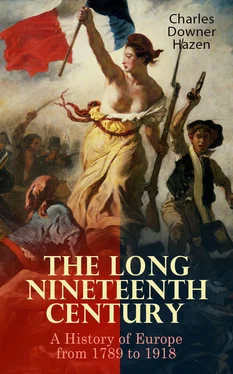There was another branch of the system of taxation which was oppressive and offensive for other reasons. There were certain indirect taxes which were collected, not by state officials, but by unpopular private individuals or companies, the farmers of taxes, as taxes they were called, who paid a lump sum to the state and then themselves collected the taxes, seeking of course to extract as much as possible from the people. Not only has this system of tax-collecting always proved most hateful, both in ancient and modern times, as the tax-farmers have always, in order to make as much as possible, applied the screws with pitiless severity, thus generating a maximum of odium and hatred; but in this particular case several of the indirect taxes would have been unjust and oppressive, even if collected with leniency, a thing never heard of. There was, for instance, the salt-tax, or gabelle, which came home, in stark odiousness, to every one. The trade in salt was not open to any one who might wish to engage in it, but was a monopoly of a company that bought the privilege from the state, and that company was most astoundingly favored by the law. For every person above seven years of age was required to buy at least seven pounds of salt annually whether he wished it or not. Even the utterly poor, who had not money enough to buy bread, were severely punished if they refused or neglected to buy the stated amount of salt. Moreover the tax-collectors had the right to search all houses from top to bottom to see that there was no evasion. Illicit trade in this necessary commodity was incessantly tracked down and severely punished. On the very eve of the Revolution it was officially estimated that 20,000 persons were annually imprisoned and over 500 annually condemned to death, or to service in the galleys, which was hardly preferable, for engaging in the illegal trade in salt. Moreover by an extra refinement in the art of oppression the seven pounds that all must buy could be used only for cooking or on the table. If one desired to salt down fish or meats for preservation, one must not use this particular salt for that purpose, but must buy an additional amount.
There was another equally intolerable tax, the excise on wine. The making of wine was a great national industry which had existed for centuries, but if ever there was a system calculated to depress it, it was the one in vogue in France. Wine was taxed all along the line from the producer to the consumer. Taxed at the moment of manufacture, taxed at the moment of sale by the producer, it was also taxed repeatedly in transportation, thirty-five or forty times for instance, between the south of France and Paris, so that the combined taxes amounted in the end to nearly as much as the cost of the original production. A trade exposed to such constant and heavy impositions could not greatly flourish.
Again the taxes both on salt and on wine were not uniform, but varied from region to region, so that the sense of unjust treatment was kept alive every day in the ordinary course of business, and smuggling was in many cases extremely profitable. This in turn led to savage punishments, which only augmented the universal discontent and entered like iron into the souls of men. In the system of taxation, as in the political structure, we find everywhere inequality of of taxation treatment, privileges, arbitrary and tyrannical regulations, unfair and coupled with uncertainty from year to year, for the regulations were not infrequently changed. No wonder that men, even nobles, criticized this fiscal system as shockingly unjust and scandalously oppressive.
The social organization of France, also, was far from satisfactory. On even the most cursory view many notorious abuses, many intolerable grievances, many irritating or harmful maladjustments stood forth, condemned by reason or the interest of large sections of the population.
Forms outworn, and institutions from which the life had departed, but whence issued a benumbing influence, hampered development in many directions. French society was frankly based upon the principle of inequality. There were three classes or orders, the clergy, the nobility, and the third estate. Not only were the two classes of former classes privileged, that is, placed upon a better footing than the last, but it is curious to observe how the pervasive principle of unequal rights broke up even the formal unity of each of these classes. There was inequality of classes and there was also inequality between sections of the same class. The two privileged orders were favored in many ways, such as complete or partial exemption from taxes, or the right themselves to tax - the clergy through its right to tithes, the nobility through its right to exact feudal dues. Even some of the members of the third estate enjoyed privileges denied the rest. There were classes within classes. Of the 25,000,000 of Frenchmen, the clergy numbered about 130,000, the nobility 140,000, while possibly about as many bourgeois as these two combined enjoyed privileges that separated them from the mass of their class. Thus the privileged as a whole numbered less than 600,000, while the unprivileged numbered well over 24,000,000. One man in forty therefore belonged to the favored minority whose lot was differentiated from that of their fellowmen by artificial advantages and distinctions.
The clergy of the Roman Catholic Church formed the first order in the state. It was rich and powerful. It owned probably a fifth of the land of France. This land yielded a large revenue, and, in addition, the clergy exacted tithes on all the agricultural products of the realm. This was in reality a form of national taxation, with this difference from the other forms, that the proceeds went, not to the nation, but to the Church. The Church had still another source of income, the dues which it exacted as feudal landlord from those to whom it stood in that relation. The total income of this corporation was approximately $100,000,000 of our money. Out of this it was the duty of the Church to maintain religious edifices and services, to support many hospitals and schools, to relieve personal distress by charity, for there was no such thing in France as organized poor relief by the state or municipality. Thus the Church was a state within the state, performing several functions which in most modern societies are performed by the secular authority. This rich corporation was relieved from taxation. Although from time to time it paid certain lump sums to the national treasury, these were far smaller than they would have been had the Church been taxed on its property and on its income in the same proportion as were the commoners. An income so large, had it been wisely and justly expended, might have aroused no criticism, for many of the services performed by this organization were essential to the well-being of France. But here as elsewhere in the institutions of the country we find gross favoritism and wanton extravagance, which shocked the moral sense of the nation and aroused its indignation, because they belied so completely pretensions to a peculiar sanctity on which the Church based its claims to its privileged position. For the organization did not treat its own staff with any sense of fair play. Much the larger part of the income went to the higher clergy, that is, to the 134 bishops and archbishops, and to a small number of abbots, canons, and other dignitaries in all probably not more than 5,000 or 6,000 ecclesiastics. These highly lucrative positions were monopolized by the younger sons of the nobility, who were eager to accept the salaries but not disposed to perform the duties. Many of them resided at court and lived the gay and worldly life, with scarcely anything, save some slight peculiarity of dress, to indicate their ecclesiastical character. The morals of many were scandalous and their intellectual ability was frequently mediocre. They did not consider themselves men set apart for a high and noble calling, they did not take their duties seriously - of course there were honorable exceptions, yet they were exceptions but their aims were distinctly finite and they conducted themselves as typical men of the world, attentive to the problem of self-advancement, devoted to all the pleasures, dissipations, and intrigues of Versailles. Some held several offices at once, discharging the obligations of none, and enjoying princely revenues. The archbishop of Strassburg had an income of $300,000 a year and held high court in a splendid palace, entertaining 200 guests at a time. Even the saucepans of his kitchens were of silver. A hundred and eighty horses were in his stables, awaiting the pleasure of the guests. A few of the bishops received small incomes, but the average among them was over $50,000 a year. They were in the main absentees, residing, not in their dioceses, but in Versailles, where further plums were to be picked up by the lucky, and where, at any rate, life was gay. Some of the bishoprics had even become the hereditary possessions of certain families, passing from uncle to nephew, as in the secular sphere many offices passed from father to son.
Читать дальше












